"A stupid idea is not enought, it also needs to be implemented..."
Rafal N.
22.04.2025


Dory! Or rather the regal blue surgeonfish (Paracanthurus hepatus)often kept in marine aquariums, where it lives for 10-15 years. In the wild, it can live up to 20, some say even 30 years. In nature, it occurs on the reefs of the Indo-Pacific, less often in other parts of the world. It has 9 stiff spines hidden in its dorsal fin, which it uses for defence, and likes warm water of 24-26 °C.
Want to know more see here:
https://twojezwierzeta.pl/zwierzeta/pokolec-krolewski-siedlisko-charakterystyka-i-rozmnazanie/

10.04.2025
10.04.2025 Wroclaw, Poland
Another step forward!

On April 10, after a long time of waiting, we were registered in the National Court Register. At last, the CRRC Foundation can now legally conduct its activities and start raising funds for our (still so far distant) goal of building a coral reef off the coast of Tenerife ....
It's an uplifting feeling!!!
15.04.2025

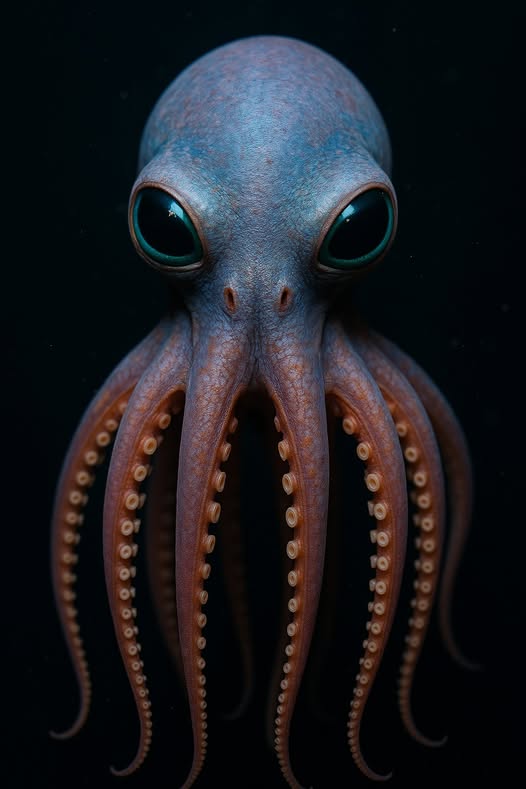
If
there are aliens on Earth, they are octopuses.
Not
because of their unusual body structure, exceptional intelligence or
amazing skills. Rather because of the elusive molecular biology
responsible for cephalopod-specific innovations.
Cephalopod
genomes during evolution have been impacted by a genome-wide
reorganization, gaining distinct gene
regulatory system and complex expression patterns. The typically
building blocks of DNA are adenosine(A), guanosine(G), cytidine(C),
thymidine(T) (or uridine(U) in RNA). Meanwhile, a striking
feature of coleoid cephalopods is their extensive editing of
messenger RNAs (mRNA) by enzymes that convert specific adenosines (A)
to inosines (I) what can lead to dramatic changes in genetic
information, so it could be said that cephalopods have the ability to
edit their genes. Moreover, mRNA editing displays two fundamentally
distinct patterns one of which occurs exclusively in the nervous
system.
Picture AI.
13.04.2025


The ocellaris clownfish(Amphiprion ocellaris), are born as immature males, the largest male in the group becomes a female and the second largest matures into a breeding male. If the female dies, the breeding male grows and turns into a female, and another male emerges from the group. If you buy two clownfish for your aquarium, you will always have a pair.
Want to know more see here:
https://akwarium.gdynia.pl/blazenki/
Fotografia: Getty Images, opublikowana w National Geographic.
06.04.2025

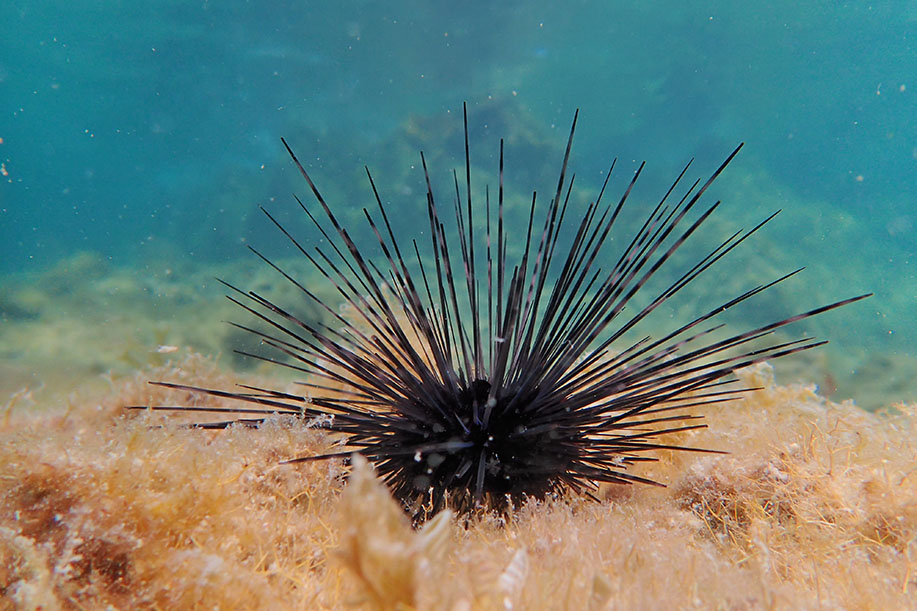
Black sea urchin (Diadema Antillarum), a spiny defender of reefs. Unfortunately, 98% of the population of this species is extinct around the Caribbean. These sea urchins feed on algae, which when ovegrowth, can smother coral reefs. Scientists have discovered that the cause of the extinction are ciliate. Now attempts are underway to cure the sea urchins.
Read more here:
https://www.science.org/doi/10.1126/sciadv.adg3200
If you want to learn more about these animals, see here:
https://www.national-geographic.pl/przyroda/jezowce-sa-bardzo-powolne-ale-w-obliczu-zagrozenia-wrzucaja-najwyzszy-bieg/

01.03.2025
29 i 31.01.2025
Marine
Data 4 Ocean Health 2025
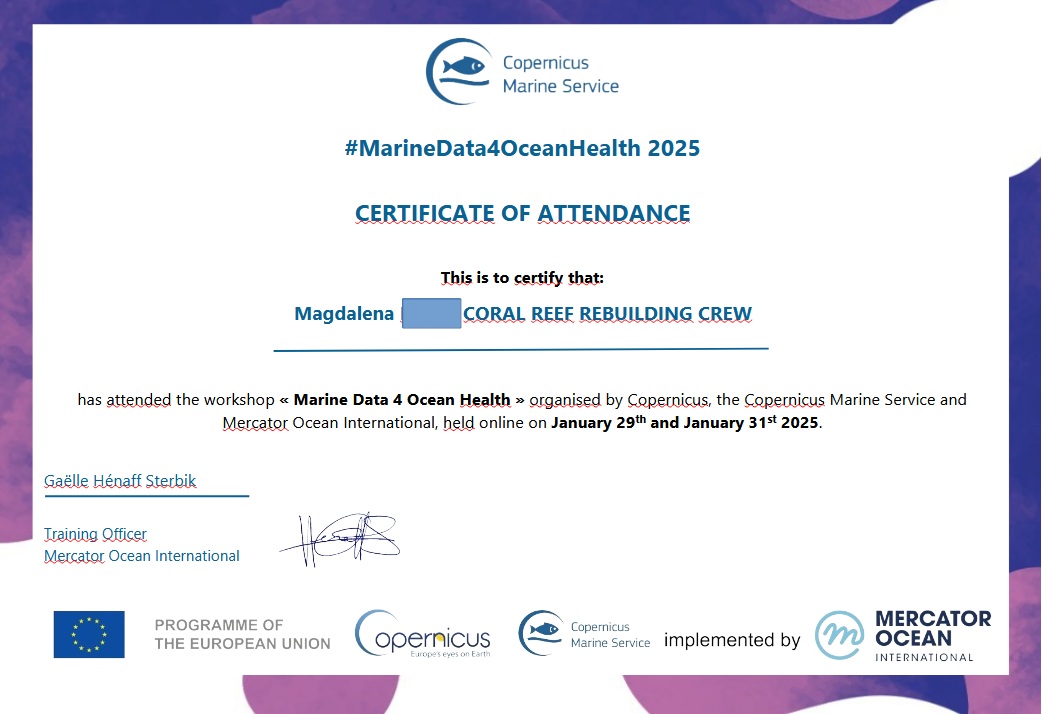
The
Copernicus Marine Service organized a two-day workshop to increase
user awareness of the state of the ocean and its health. The aim of
this workshop was to share applications of the Copernicus Marine
Service products in ecosystem monitoring studies and to focus on the
main marine and regional challenges. The workshop covered a number of
related topics, ranging from phytoplankton, coral reefs, oil spills
and eutrophication. CRRC participated in the event online of course, however replays and
presentations are still available:
https://events.marine.copernicus.eu/marine-data-4-ocean-health/
see
also current and upcoming events:
Dataviz
Webinar Series
ThreeWebinars: 20 February & 6 March & 20 March https://events.marine.copernicus.eu/dataviz-webinar-series
Marine
Data 4 Africa 2025
March
3rd & March 5th
https://events.marine.copernicus.eu/marine-data-4-africa
26.02.2025

09.02.2025 - Utopia Island, Hurghada, Egipt
Dive in Nature Reserve.
We are concerned about the condition of the reef in this area. Only a few corals are doing well. The ecosystem has suffered greatly, due to excessive tourism, mostly. Fortunately, the Egyptian authorities have begun to act on this issue and want to create a nature reserve on the entire coast of the Red Sea.
https://www.hurghada24.pl/.../egipt-uczyni-rezerwatem...
03.01.2025

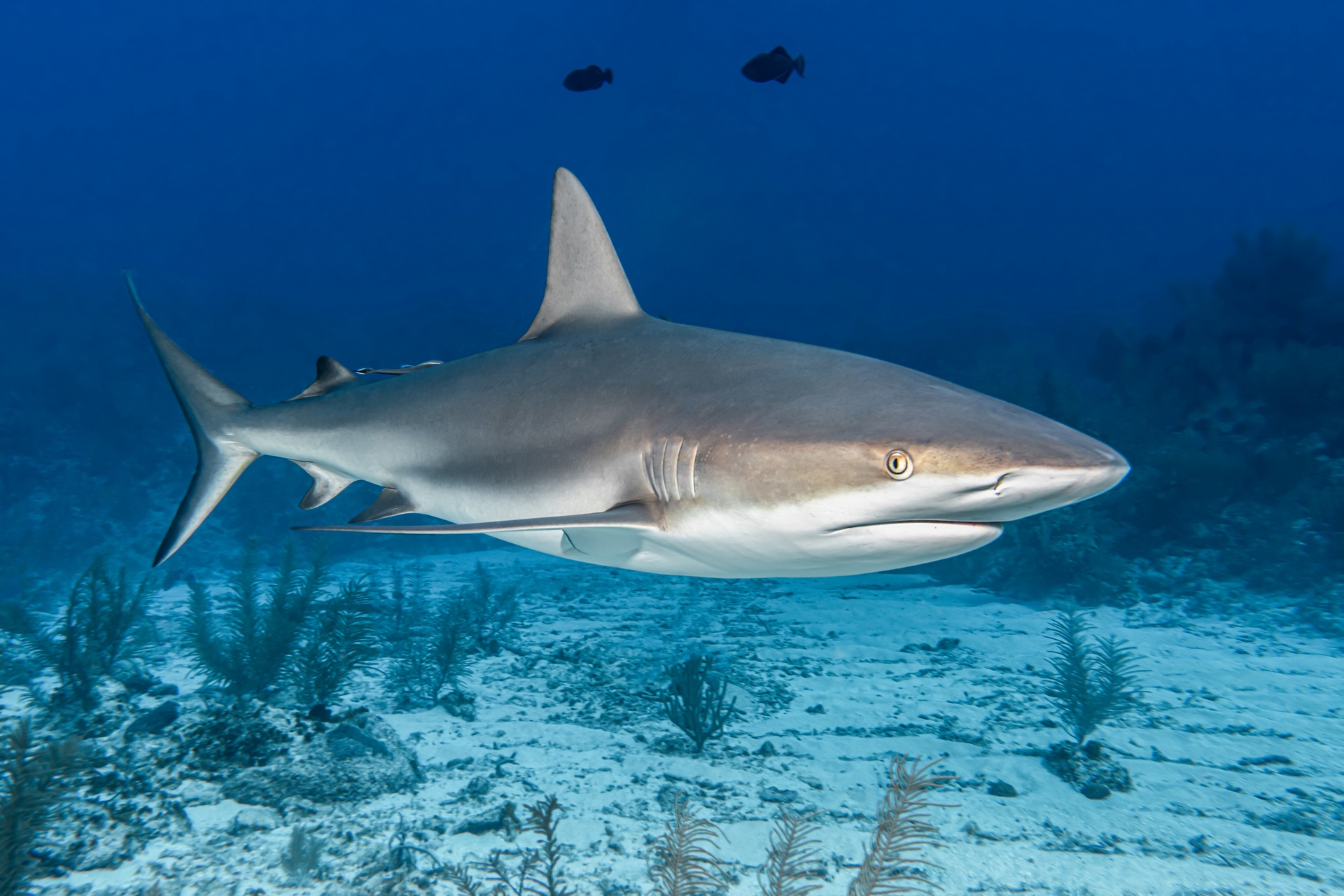
The grey reef shark or gray reef shark - Carcharhinus amblyrhynchos
A common shark in the Indo-Pacific and Red Sea region. It is often seenby divers on shallow coral reefs, especially near steep slopes. They are not aggressive towards humans, they are curious rather, and this causes they frequently swim up and look at divers. Gray Reef Sharks are currently listed as endangered on the IUCN Red List, and their global populations are declining. These animals are an important part of the coral reef ecosystem. A significant portion of their diet consists of smaller predators, which in turn are a threat to reef fish. Thanks to sharks, therefore, there is a balance in the food chain.
22.12.2024
And what will happen in the Great World in 2025?

12-17.01.2025 Hong Kong SAR, China
Deep Sea Biology Symposium
https://17dsbs.hkust.edu.hk/
The 17DSBS aims to bring together experts from around the world who have strong interest in deep-sea biological science, biodiversity conservation, deep-sea environmental policy and management for better protection of deep-sea biodiversity and ecosystems.
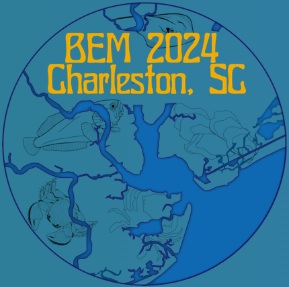
01-04.04.2025 Mobile, Alabama, USA
53nd Annual Benthic Ecology Meeting
https://bem.disl.edu/bem2025.html
Benthic Ecology Meeting Society (BEMS) is a non-profit organization established to run a yearly meeting to exchange scientific information focusing on marine benthic ecosystems (e.g., rocky intertidal, coral reef) and to foster the next generation of benthic biologists.
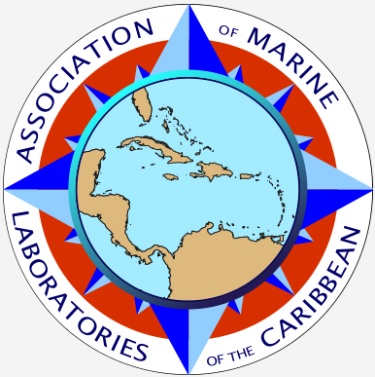
02-06.06.2025 San Juan, Puerto Rico
Association of Marine Laboratories of the Caribbean (AMLC) Conference
http://amlc-carib.org/2025-amlc-meeting
TheAMLC 41st scientific meeting is open to everyone, including students, scientists, and stakeholders, with an interest in marine science and policy in the wider Caribbean region. By bringing together participants from a broad collection of geographic and scientific specialties, the meeting provides a setting for the synthesis of new ideas, discoveries, and techniques; and serves to expand regional and interdisciplinary collaborations throughout the wider Caribbean region.

09-13.06.2025 Nice, France
UN Ocean Conference 2025
https://sdgs.un.org/conferences/ocean2025
Theoverarching theme of the UN Conference is “Accelerating action and mobilizing all actors to conserve and sustainably use the ocean”. The Conference aims to support further and urgent action to conserve and sustainably use the oceans, seas and marine resources for sustainable development and identify further ways and means to support the implementation of SDG 14 (Sustainable Development Goal 14). It will build on existing instruments to form successful partnerships towards the swift conclusion and effective implementation of ongoing processes that contribute to the conservation and sustainable use of the ocean.
03.11.2024

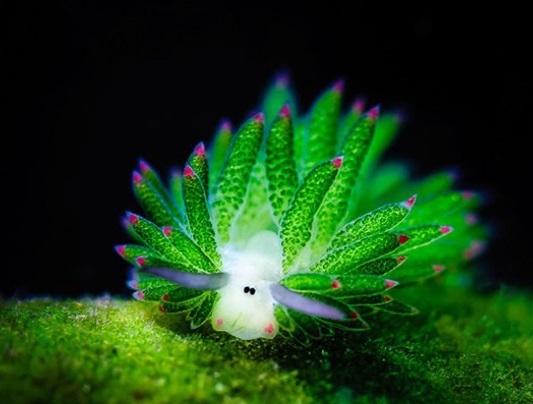
This animal, discovered in 1993 and called the “sea sheep,” is a unique snail (Costasiella kuroshimae). The size of an adult is just 5mm, it lives in tropical climates, inhabiting waters near Japan, Indonesia and Philippines. In addition to being cute, it has another incredible property. It feeds on algae, parts of which - chloroplasts - it absorbs and uses for a short time as its own, which is called kleptoplasty (a type of symbiosis). This allows sea sheep to obtain energy from photosynthesis. Which makes it a solar-powered snail. Marine, natural photovoltaics!
28.10.2024


“Lionfish” or 'Firefish', a fish of the Scorpenidae family. Beautiful and dangerous, it has venomous spines. A predator that hunts near hard bottom, usually near coral reefs. It displaces other fish species and, although it does not destroy corals directly, it indirectly contributes to environmental degradation. However, it has tasty meat, so we suggest, if you have the opportunity, to eat “lionfish ceviche” - Do it. The seacoast restaurants are serving this delicious dish more and more often. Or maybe you can prepare it yourself ? Here is a link to how to prepare “ceviche”. https://kukbuk.pl/artykuly/jak-zrobic-ceviche/
Enjoy!
17.10.2024

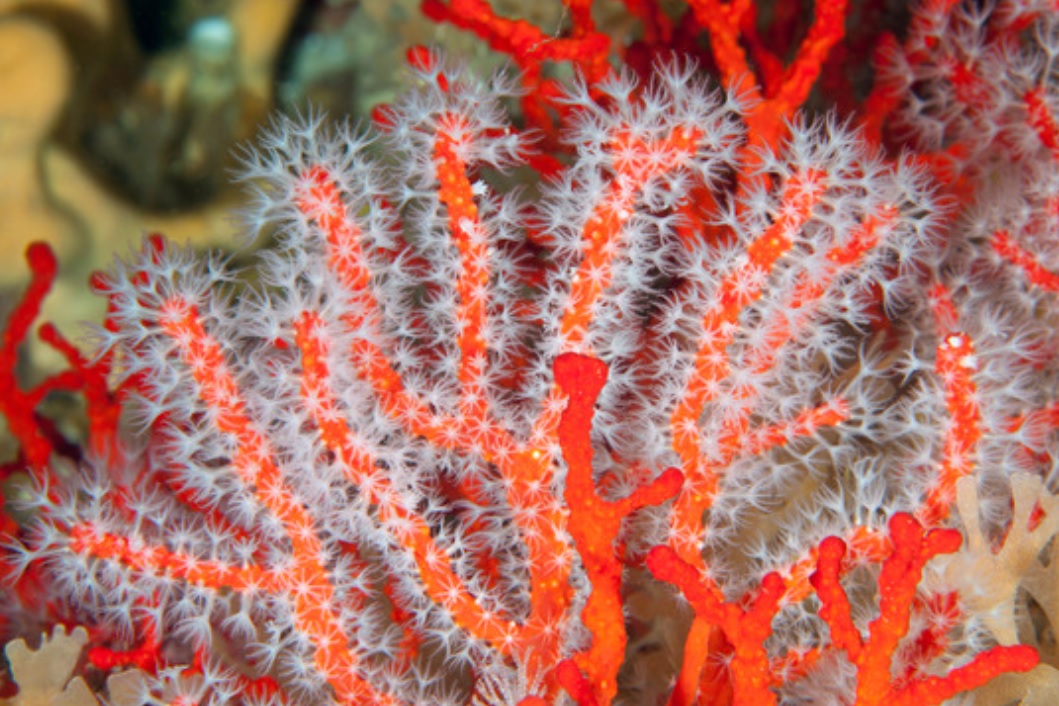
Red coral (Corallium rubrum), also called precious coral. One of the most recognizable coral species.
Reef-forming coral (Madrepora coral).
16.10.2024

12-13.10.2024 - Piechcin, Poland
Diving in the flooded quarry Piechcin
GPS: 52°48.894'N 18°01.729'E ( near Bydgoszcz,Poland)
andanother scientist with a pass to the underwater world - we are very happy because Dr. Magdalena is a CRRC member and she has just passed theOWD (Open Water Diver) exam! CONGRATULATIONS!
26.09.2024


Acropora ECHINATA. Hard coral, demanding, difficult to maintain. Can be found on shallow, tropical, sheltered reefs in marine environments, at depths between 8 and 25 m.
26.09.2024


Candy Apple Pink Zoanthus are soft corals belonging to the Zoanthidae family, commonly called Zoanthus.
Quite easy to keep in an aquarium. They look beautiful with proper lighting.
24.09.2024
21.09.2024 Kierskie Lake - Poznań,Poland
Underwater cleaning during the finale of the 31st Clean Up the World Campaign - Poland!
https://naszaziemia.pl/2024/10/18/wielki-final-31-akcji-sprzatanie-swiata-polska/
This time we were diving during the second day of the Clean Up the World - Poland finale in the city of Poznań.Together with the Poznań Sports and Recreation Centre, the Perfect Diver Magazine, the Kierskie Lake Water Protection Company and about 100 volunteer divers, we cleaned up the beautiful and charming Kierskie Lake. You can see what we found at the bottom in the photos. Attached some pictures from the event too. More about the campaign in the link.

20.09.2024
13.09.2024 Poznan, Poland
Official birthday of the CRRC Foundation!!!
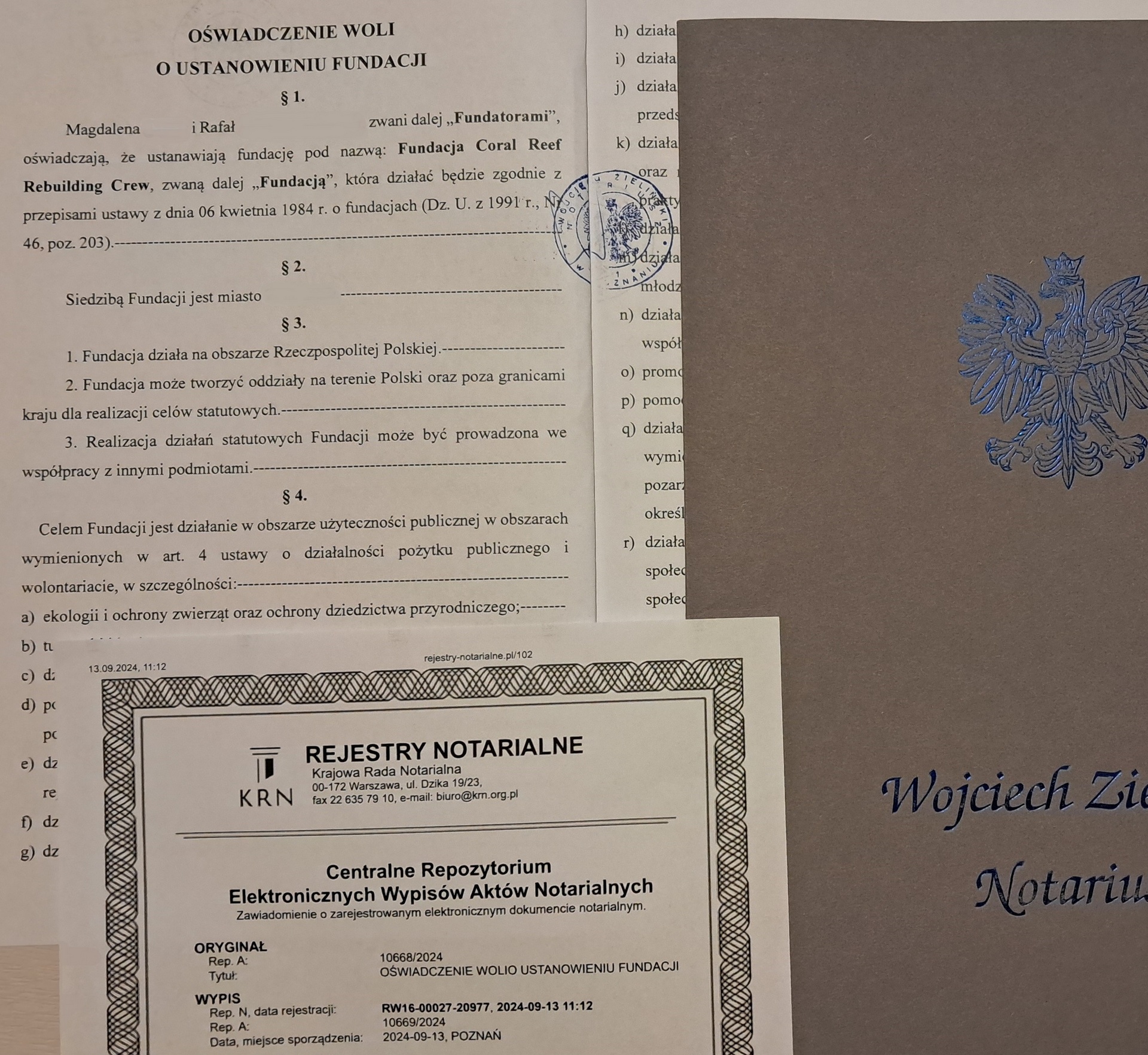
Notarial deed signed :)
AND HERE ARE EXCERPTS FROM THE CRRC FOUNDATION STATUTE:
§ 5 [Implementation of the objectives of the Foundation].
1. The Foundation shall achieve its objectives by:
[...]
2)Design and production of artificial reef elements. Organization of their transportation, sinking and installation on the bottom of the sea floor with the participation of divers, using specialized vehicles and vessels, ensuring safe transportation of structures, equipment and people.
3)Acquisition of corals and their gametes from various regions of the world and breeding of cross-breeds of particular species. Live coral fragments will also be used for vegetative propagation. The process of coral growth, evaluation and selection will use AI (artificial intelligence). The grown individuals will be transplanted to the artificial reef or remain in the laboratory for further reproduction.
4)The construction of a training and research center, starting with the purchase of a plot of land and the execution of a construction project, taking into account modern, environmentally friendly technical solutions such as photovoltaics, wind turbines and seawater desalination systems.
[...]
8)Conducting scientific, research and innovation activities…
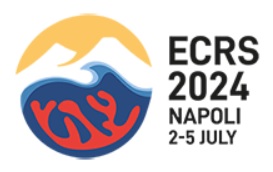
23.07.2024
02-05.07.2024Naples, Italy
European Coral Reef Symposium = ECRS 2024 https://ecrs2024.eu/
The ECRS is held every four years and hosted in European countries on a rotation basis by the European Chapter of the International Coral Reef Society (ICRS). In this edition of the ECRS, the energy of the participants was focused on bridging the knowledge gaps between tropical, temperate and cold-water coral reefs.
Unfortunately, this time we did not participate, not yet... The next conference will be held in 2028, but the location of the event will be known only in early 2025...
March 2022 Tenerife, Espania.
I'm sitting on the rocks on the ocean shore and watching the waves crashing on the shore.
- If there was a reef here, these waves wouldn't be there, or they would be smaller - I thought - maybe I'll plant it here.
I laughed about it then, but the seed had been sown.
12.03.2024